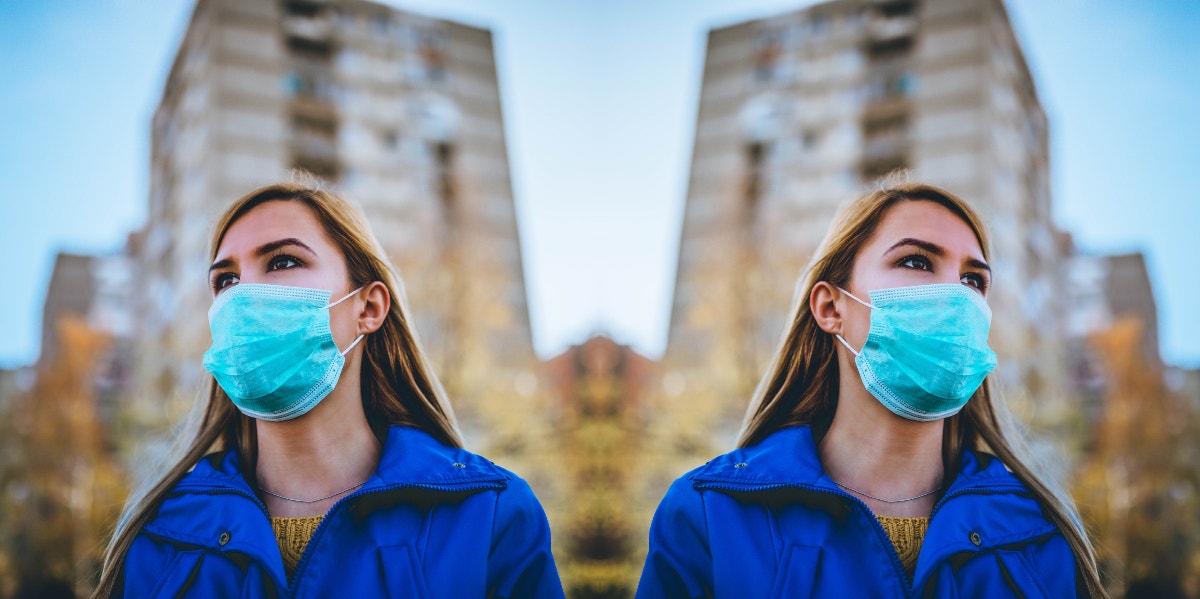No, Wearing A Mask Does Not Limit Your Oxygen Intake
Wearing a mask does not cause carbon dioxide poisoning or hypoxia — stop the excuses.
 Getty Images
Getty Images Since the start of quarantine and social distancing, wearing masks has been a very touchy subject for some. Some are willing to wear masks to keep themselves and others safe while others oppose the idea.
Some can’t wear a mask for medical reasons (in which case a face shield is an option), but others have no actual excuse.
Their reasoning? The mask limits their oxygen intake and inhibits their ability to breathe.
Recently, doctors have proven that idea false and say that the amount that a person breathes in with the mask is the same without the mask. And experts prove that even with the carbon dioxide we breathe in isn’t a big amount to kill a person.
So does wearing a mask reduce the oxygen intake for a person? Or was it an idea formed out of paranoia?
What started the mask debate
On April 23, a driver in New Jersey lost consciousness, causing his vehicle to go off-road. Police in the area posted on Facebook about the incident and claimed it was caused by the driver’s lack of oxygen from wearing an N95 mask.
They updated the post saying “While we don't know this with 100% certainty, we do know that the driver had been wearing an N95 mask inside the vehicle for several hours and ultimately passed out while operating the vehicle.”
Comments under the post range from agreeing to the original statement made to those saying the mask wasn’t the issue. Some even brought up that most doctors have to wear a mask all day and don’t have this problem.
Whether the accident was caused by the mask or not, more people are starting to believe that wearing masks can lead to something harmful. That includes carbon dioxide poisoning, hypoxia or hypoxemia.
What causes CO2 poisoning and hypoxia?
Carbon dioxide poisoning is caused by not breathing often or deeply enough, rebreathing exhaled air (such as from under a blanket) or breathing in an enclosed space (a closet or shed). Hypoxemia is when there is a low percentage of oxygen in the blood, which can cause hypoxia.
Hypoxia is a result of a severe asthma attack, lung damage due to trauma, lung diseases (chronic obstructive pulmonary disease, emphysema, bronchitis, pneumonia and pulmonary edema), strong pain medicines, heart problems, anemia or cyanide poisoning.
People’s worry about masks causing carbon dioxide poisoning makes some sort of sense, but that is only if they wear a mask that is too tight. It would also only be possible if one doesn’t take breaks while wearing a mask.
How to keep from passing out from wearing a mask
If a person does have issues breathing without a mask originally, then it is best to stay home so there isn’t a need to wear a mask. If a person does not have breathing issues, one should make sure the type of mask is the correct one.
According to the CDC website, they advise people if they are to wear a mask, to wear one made of cloth, and not one meant for a healthcare worker (surgical masks and N95). Cloth masks can be bought online or can be made.
Here are instructions to make your mask at home:
Dr. Sigfredo Aldarondo told Healthline that people should “be mindful of their respiratory pattern and consider doing several slow deep ‘healthy’ breathing maneuvers before and after donning the mask. Periodic breaks, when feasible are advisable.”
He also advised that the mask should cover both the nose and mouth along with the mask being large enough to cover the surrounding areas for precaution.
Why can’t I wear an N95 mask?
N95 masks, along with surgical masks, should be reserved for healthcare professionals as they are needing that protection in their everyday routine.
Darrell Spurlock, Ph.D. and RN stated on Healthline that “Rebreathing tiny amounts of CO2 from wearing either properly fitted N95 respirators or more loosely fitted cloth or surgical masks is of no concern for the vast, vast majority of people.”
He also shares that “The ‘dose’ of CO2 we might rebreathe while masking is quickly and easily eliminated by both the respiratory and metabolic systems in the body.”
Is there more proof that wearing a mask doesn’t lessen oxygen intake?
On June 26, Dr. Megan Hall posted on the Ohio Health Care Association Facebook page her experiment. She posted a picture of herself without a mask, wearing a surgical mask, wearing an N95 mask, and wearing both the surgical mask and an N95 mask.
Even though she is wearing masks that the public shouldn’t, that isn’t the main focus of the post. Dr. Hall wanted to show that with masks like the N95 that are thicker than a cloth mask she is still able to get the same if not around the same amount of oxygen as she did without the mask.
On Twitter, Dr. Eric Ball posted his results two days before Hall’s post.
Dr. Pete DeBalli responded to the tweet with his results as well, this time a video.
So no, wearing a regular cloth mask does not cause a lack of oxygen.
It is advised if you have prior respiratory problems or even a disability that keeps you from being able to wear a mask, talk to your doctor and ask what to do. One should also only wear cloth masks and make sure it is snug.
Isabell Tenorio is a YourTango editorial intern.

